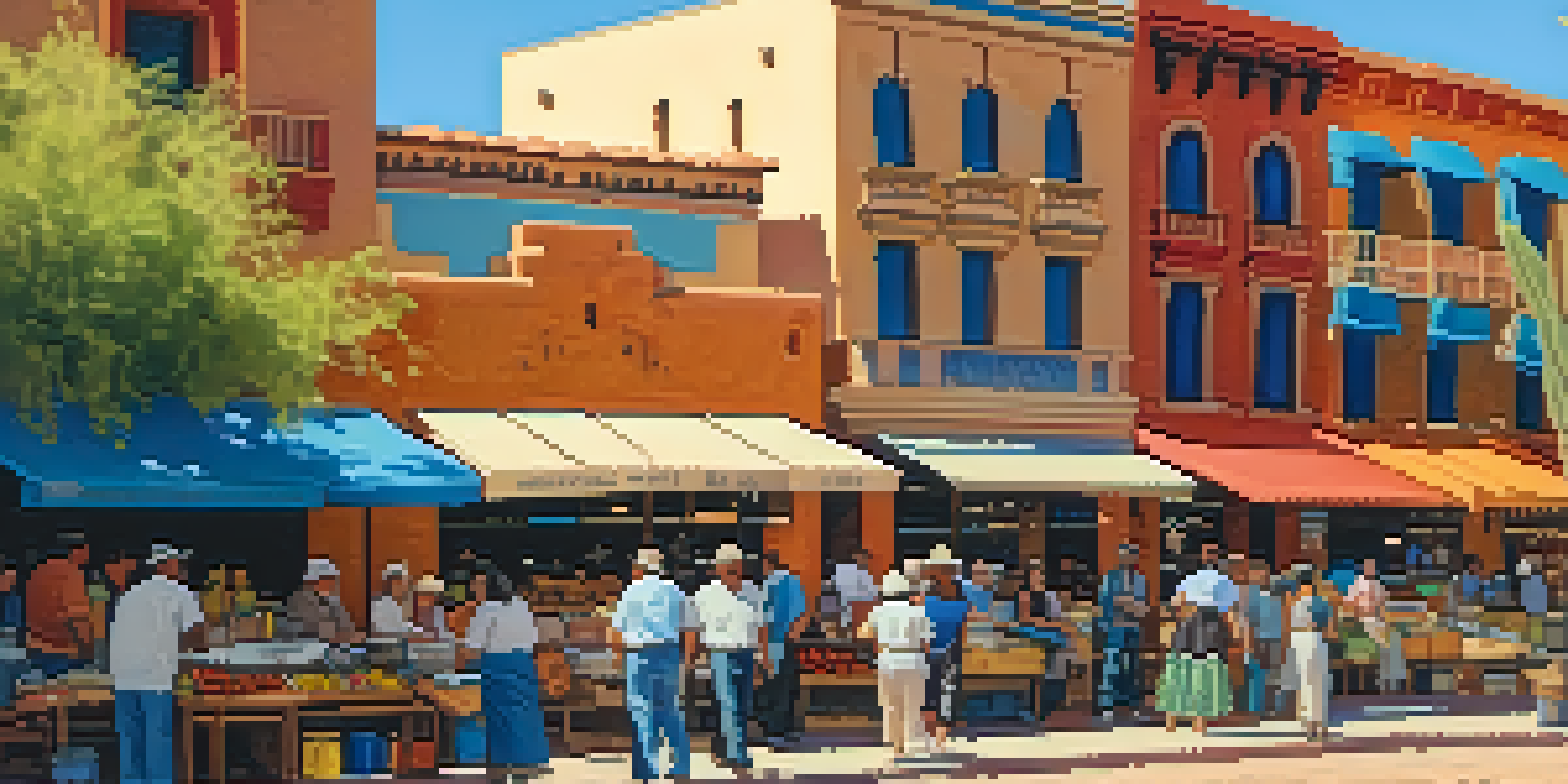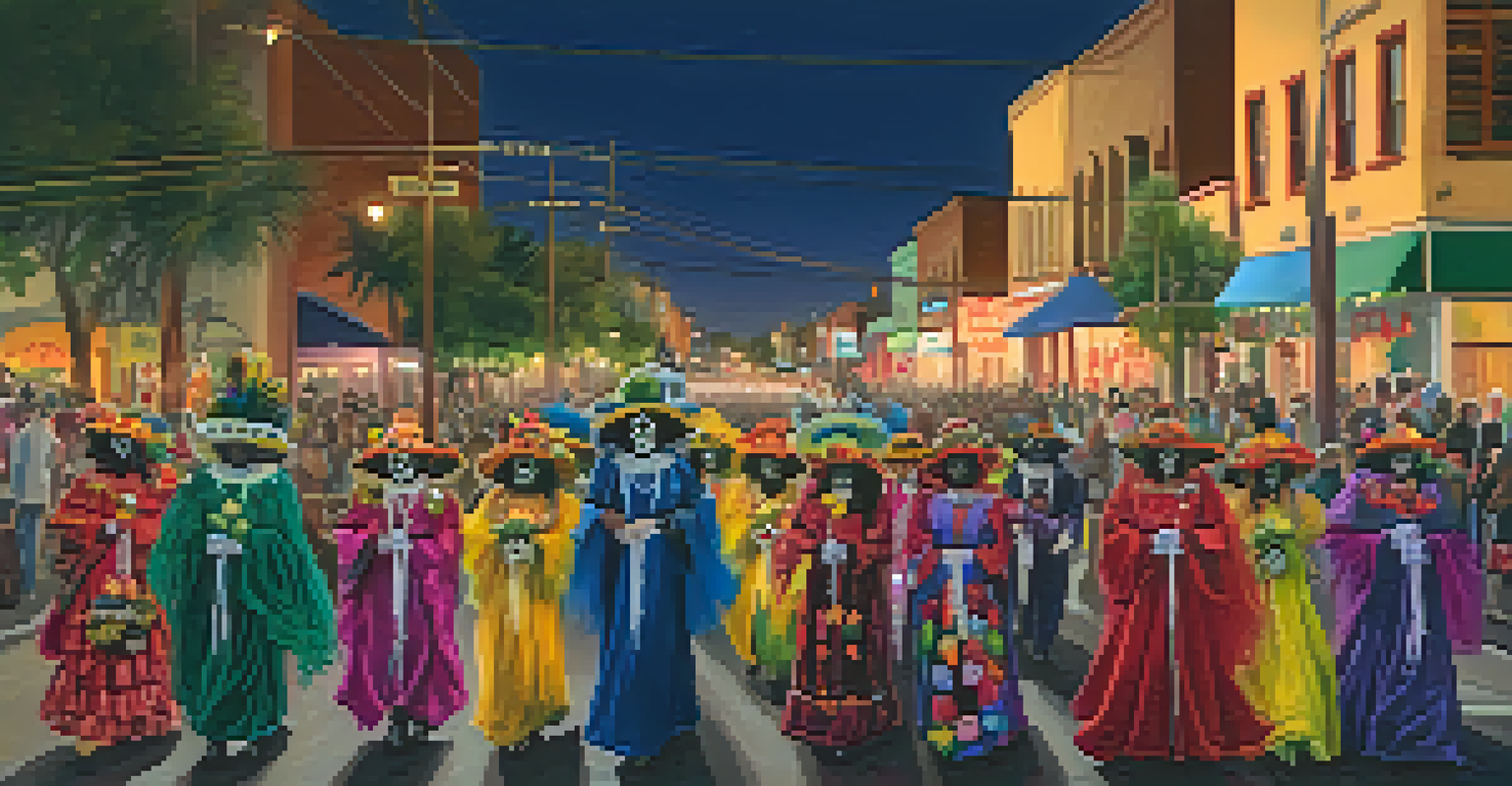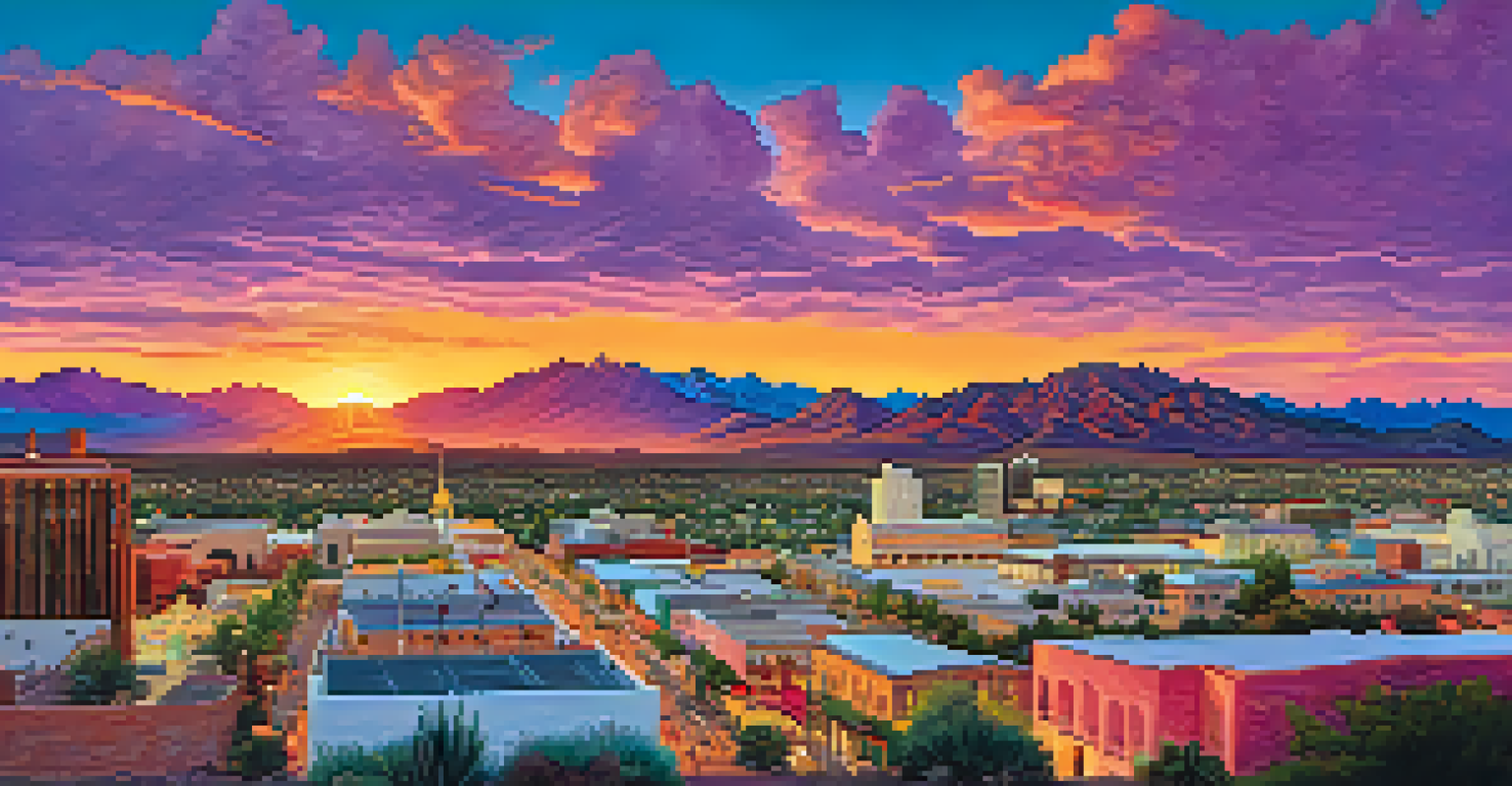Tucson's Cultural Landscape: Demographics and Identity

Understanding Tucson's Diverse Demographics
Tucson is a melting pot of cultures, with a rich tapestry of demographics that reflect its historical roots and contemporary evolution. The city boasts a population that includes a significant percentage of Hispanic and Native American communities, which adds to its unique cultural flavor. According to recent statistics, nearly 45% of Tucson's residents identify as Hispanic or Latino, highlighting the deep cultural influence in the area.
Diversity is not a reason for division. It is a reason for celebration.
This diverse demographic landscape shapes Tucson's identity, blending traditions, languages, and lifestyles. The presence of various ethnic groups means that you'll find a rich array of cultural festivals, culinary delights, and artistic expressions throughout the city. Each community contributes its own stories, making Tucson a vibrant place to live and visit.
Understanding these demographics is essential for grasping the city's cultural dynamics. The interplay between different groups fosters a sense of community and shared identity, while also celebrating individual heritage. This blend of cultures not only enriches the lives of Tucson residents but also invites visitors to experience something truly special.
Tucson's Historical Roots and Their Impact
Tucson's history is deeply intertwined with its cultural landscape, dating back to its establishment as a Spanish military fort in the late 1700s. This colonial past laid the groundwork for a city that would become a crossroads of Native American, Mexican, and Anglo-American cultures. Each wave of settlers brought their own traditions and customs, creating a unique cultural fusion that defines Tucson today.

The influence of the Indigenous peoples, particularly the Tohono O'odham and Pascua Yaqui tribes, is still palpable in Tucson's art, language, and spiritual practices. Their contributions are celebrated in local museums, art galleries, and festivals. This historical richness not only adds depth to Tucson's identity but also fosters a sense of pride among its residents.
Tucson's Cultural Diversity Shines
Tucson's rich demographic landscape, which includes significant Hispanic and Native American communities, creates a vibrant cultural identity that celebrates various traditions and lifestyles.
By recognizing and honoring its historical roots, Tucson continues to evolve while staying connected to its past. This awareness helps residents appreciate the complexities of their identity and the shared experiences that shape their community. It's a reminder that Tucson's cultural landscape is not just about the present; it's a living narrative that honors its diverse origins.
The Role of Education in Shaping Identity
Education plays a crucial role in shaping Tucson's cultural identity, with institutions that promote understanding and appreciation of diversity. The University of Arizona, for example, serves as a hub for multicultural education, offering programs that highlight the city’s rich heritage. This emphasis on education fosters a sense of community and encourages dialogue among different cultural groups.
Culture is the arts elevated to a set of beliefs.
Local schools often celebrate cultural events and incorporate multicultural curricula, helping students understand the value of diversity from a young age. This creates an environment where cultural differences are not just acknowledged but celebrated, forming a strong foundation for future generations. As students learn about each other's backgrounds, they cultivate a sense of belonging in a richly diverse society.
Moreover, educational initiatives often extend beyond the classroom, engaging families and community members in cultural exchanges and events. This collaborative approach to education builds bridges between different groups, allowing Tucson's residents to learn from one another and grow together. Ultimately, education in Tucson is not just about academics; it's about nurturing a shared identity that honors all cultures.
Culinary Diversity: A Taste of Tucson
Tucson's culinary scene is a delicious reflection of its cultural diversity, offering a range of flavors that tell the stories of its residents. From classic Sonoran dishes like carne asada to vibrant Mexican street food, the local cuisine is a celebration of heritage and tradition. The city's designation as a UNESCO City of Gastronomy further emphasizes its culinary richness and the importance of food in cultural identity.
Food festivals and markets, such as the Tucson Meet Yourself event, showcase the city’s diverse culinary landscape, allowing residents and visitors to sample dishes from various cultures. These gatherings not only promote local chefs and artisans but also foster a sense of community and shared experiences. People come together to enjoy good food while learning about the cultural significance behind each dish.
Education Fosters Cultural Understanding
Educational institutions in Tucson promote multicultural awareness, helping students appreciate diversity and building a strong community identity.
Moreover, Tucson's culinary diversity extends to innovative fusion cuisine, where chefs blend traditional flavors with modern techniques. This creativity reflects the city’s evolving identity, as new generations reinterpret their cultural heritage through food. In Tucson, every meal is a reminder of the rich cultural tapestry that defines this vibrant city.
Art and Expression: The Heart of Tucson's Culture
Art plays an integral role in Tucson's cultural landscape, serving as a medium for expression and storytelling. The city is home to numerous galleries, public art installations, and cultural festivals that highlight the contributions of local artists from various backgrounds. This vibrant arts scene not only enriches the community but also reflects the diverse identities that shape Tucson.
Events like the All Souls Procession are perfect examples of how art brings people together to celebrate life and honor those who have passed. This annual event showcases a blend of cultural traditions, including, but not limited to, Día de los Muertos, and allows participants to express their grief and joy through creative means. It’s a powerful reminder of how art transcends language and cultural barriers.
Additionally, Tucson’s commitment to supporting local artists fosters a sense of pride and ownership within the community. By providing platforms for artistic expression, the city encourages dialogue and collaboration among different cultural groups. In this way, art becomes a unifying force, helping to weave together the diverse threads of Tucson's cultural identity.
Festivals and Celebrations: A Cultural Showcase
Tucson's calendar is filled with festivals and celebrations that highlight the city's rich cultural heritage. Events like the Tucson International Mariachi Conference and the Tucson Folk Festival attract participants and audiences from all over, showcasing the talents and traditions of various cultural groups. These gatherings foster a sense of pride and unity, allowing residents to celebrate their identities together.
Each festival is an opportunity for cultural exchange, where attendees can learn about different traditions through music, dance, and art. For example, the Tucson Meet Yourself festival offers a platform for local artisans and food vendors to share their crafts and culinary delights, creating a vibrant atmosphere of community and celebration. These events not only entertain but also educate, deepening the understanding of Tucson's cultural landscape.
Festivals Celebrate Tucson's Heritage
Tucson's numerous festivals and celebrations provide opportunities for cultural exchange, allowing residents to share and honor their diverse traditions.
Moreover, these celebrations strengthen community ties and create lasting memories for participants. Families, friends, and neighbors come together to share in the joy of cultural expression, reinforcing the bonds that connect them. In Tucson, festivals are more than just events; they are a vital part of the cultural identity that brings the community to life.
The Future of Tucson's Cultural Landscape
As Tucson continues to evolve, so too does its cultural landscape. The city is becoming increasingly recognized for its commitment to inclusivity and diversity, which plays a significant role in shaping its future identity. Initiatives aimed at fostering collaboration among different cultural groups are paving the way for a more harmonious community, where every voice is valued.
With the younger generation taking an active role in preserving and promoting their cultural heritage, Tucson's rich traditions are likely to thrive. This generational shift encourages a cycle of learning and appreciation, ensuring that the unique stories and experiences that define Tucson are passed down. As these young leaders emerge, they bring fresh perspectives and ideas that can further enrich the cultural landscape.

Ultimately, the future of Tucson's cultural identity lies in its ability to embrace change while honoring its past. By fostering an environment that celebrates diversity and encourages dialogue, Tucson can continue to be a beacon of cultural richness. The city’s identity will keep evolving, but its core values of community, inclusivity, and cultural pride will remain steadfast.